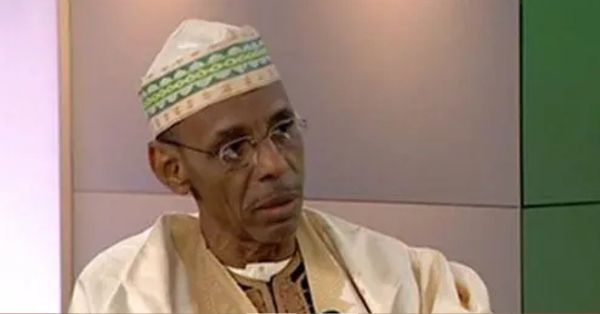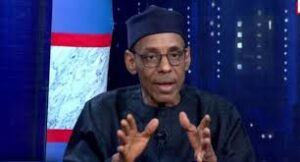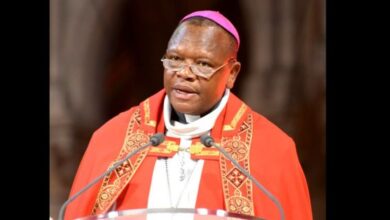Why Dr. Hakeem Baba-Ahmed’s Exit Signals a Political Reckoning

Why Dr. Hakeem Baba-Ahmed’s Exit Signals a Political Reckoning – In the noisy corridors of Nigerian politics, few resignations have sparked the kind of national reflection that followed Dr. Hakeem Baba-Ahmed’s decision to walk away from President Bola Tinubu’s administration. Not just a quiet bow-out, his departure came with a thunderous message: “Our generation has done its time—let the new voices lead.”
Dr. Baba-Ahmed, a veteran political actor, respected public intellectual, and former spokesman for the Northern Elders Forum (NEF), didn’t just resign—he detonated a political truth bomb wrapped in a statesman’s voice. In a scathing yet hopeful open letter, he urged Tinubu to relinquish the 2027 re-election bid and instead catalyze a historic political transition.
This is more than just politics. It’s about legacy, responsibility, and the soul of a nation trying to find its way.
“It’s Time to Let Go”: A Message From Within
When Dr. Baba-Ahmed accepted the position of Special Adviser on Political Affairs in the office of the Vice President back in September 2023, many believed he would be the moral compass within the Tinubu administration—a sober voice in a government often criticized for elitism and detachment.
But fast forward to April 2025, and his resignation letter reads like a eulogy for hope. He cited the government’s “inability to convert goodwill into effective leadership”, a lack of a coherent governance plan, and a closed-door leadership style that sidelined competent voices and fueled national alienation.
“I never met the President once in 18 months,” he revealed. In that silence, his disillusionment grew.
An Open Letter That Shook the Nation
On Wednesday, just days after his resignation, Dr. Baba-Ahmed published an open letter that was both an indictment and an invitation—an indictment of a presidency that, in his words, has “become consumed by 2027,” and an invitation to President Tinubu to be remembered as the leader who paved the way for Nigeria’s renewal.
“Step aside — not for your opponents, but for a new generation of Nigerians who can carry the nation forward with fresh energy and ideas,” he wrote.
His tone was sharp but not bitter. It was the voice of a man who had seen too much to stay silent but still believed in the possibility of change. According to him, this moment is not just about Tinubu; it’s about Nigeria’s political culture at large—one that desperately needs to evolve beyond recycled names and tired strategies.
“Our Generation Has Done Its Time”
It’s a stunning admission, especially from someone who’s been part of Nigeria’s political landscape for decades: “Our generation has done its time.”
Dr. Baba-Ahmed wasn’t just asking Tinubu to step aside—he was asking all political elders to take a bow, to let go of their monopolies on leadership and allow young Nigerians to chart a new course.
He called for a “peaceful, historic transformation,” one driven by merit, unity, and bold vision—not by old political debts or entrenched interests. In his words, if Tinubu and the APC made this move, it would be a “masterstroke” that could transform not just governance, but the soul of Nigerian democracy.
A Government Out of Touch
One of the harshest critiques in Dr. Baba-Ahmed’s letter centers on the disconnect between Tinubu’s administration and the Nigerian people. While acknowledging that Tinubu inherited a struggling economy and an exhausted citizenry, Baba-Ahmed faulted him for not stepping up to the moment.
His criticism is both structural and personal:
-
“Renewed Hope,” he says, is not a plan but a collection of campaign slogans.
-
More than half the cabinet, he asserts, has no business in leadership, lacking the competence to rebuild trust, improve security, or lift livelihoods.
-
Tinubu’s leadership style is insular, marked by absenteeism, ethnic favoritism, and silence in the face of national anxiety.
“The image is of an isolated leader heading an insular administration,” he warned.
Even the government’s communication strategy came under fire. According to him, confusion reigns, with a bloated team of spokespersons who “often confuse rather than clarify” the government’s direction.
“Watch 2027 — But Don’t Be Consumed by It”
In a country where politics often overshadows governance, Baba-Ahmed’s warning was both timely and sobering: if Tinubu shifts his gaze too early toward 2027, he risks losing momentum and squandering the little goodwill that remains.
“Two years is a long time — you can still achieve much,” he advised. But he also cautioned that winning re-election without reforming leadership style and substance could mean four more years of failure.
And if Tinubu loses? “Your legacy could be wiped out in an instant.”
This was no mere political jab—it was the voice of someone who had been inside the engine room, seen the machinery malfunctioning, and decided to sound the alarm before the ship sinks further.
A Fractured Nation: Regional Realities
One of the most chilling parts of Dr. Baba-Ahmed’s letter is his breakdown of Nigeria’s current regional mood. In his analysis:
-
The North is drifting away under the weight of economic despair and insecurity.
-
The East remains politically disengaged, its voice muffled and its energy untapped.
-
The South-South is fragmented, lacking a unifying political or economic direction.
-
The South-West, traditionally seen as Tinubu’s stronghold, is lukewarm, burdened by the cost of loyalty.
-
And the North-East, long battered by conflict, is too wounded to be ignored or taken for granted any longer.
His conclusion? The country is deeply dissatisfied, and without an inclusive, honest, and people-driven approach, no government—APC or otherwise—will survive the storm brewing beneath the surface.
A Voice for the Future, Not Just the North
Though he remains a prominent voice from the North, Baba-Ahmed’s message is national in scope. He has repeatedly dismissed the notion that Nigerian youth are unprepared to lead, arguing instead that they are suffocated by a system designed to keep them powerless.
Referencing Nigeria’s founding fathers, many of whom led the country in their 30s and 40s, he asks, “What’s changed? Certainly not the potential—just the gatekeepers.”
And now, with his resignation, he is repositioning himself not just as a critic of the Tinubu administration, but as a bridge between the old guard and the emerging class of leaders.
He has hinted that the North will soon unveil its unified position on 2027, and it’s likely that Baba-Ahmed will play a key role in whatever political movement emerges.
What Now for Nigeria—and Tinubu?
Dr. Hakeem Baba-Ahmed has done what few insiders dare to do: Speak the uncomfortable truth at personal cost. His exit from government may appear like a retreat, but in truth, it’s a re-entry into a broader battle for Nigeria’s future.
His words challenge the president to reflect not on political strategy but on historical legacy: Will Tinubu be remembered as a bridge to Nigeria’s rebirth—or another missed opportunity?
Time will tell. But what’s clear is this: Dr. Baba-Ahmed’s resignation is not the end of his influence—it’s the beginning of a new chapter, one that may very well shape the path to 2027 and beyond.
Final Word: A Wake-Up Call in an Open Letter
For Nigerians, this moment is a chance to look deeper than partisan loyalties and ask the hard question: Are we better off today? For Tinubu and the APC, it’s a rare opportunity to pivot from politics to purpose.
And for a younger generation aching for relevance, Dr. Hakeem Baba-Ahmed’s call is a green light: Step up. Speak out. And get ready to lead.
Because as he’s just shown the nation—integrity still matters. And it still speaks volumes.








Hi, I wanted to know your price.
Which of the services Do you want, please?